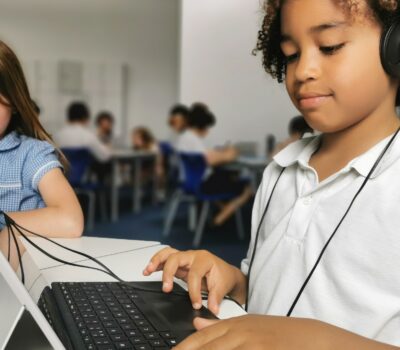


Our team sorts through all blog submissions to place them in the categories they fit the most - meaning it's never been simpler to gain advice and new knowledge for topics most important for you. This is why we have created this straight-forward guide to help you navigate our system.


And there you have it! Now your collection of blogs are catered to your chosen topics and are ready for you to explore. Plus, if you frequently return to the same categories you can bookmark your current URL and we will save your choices on return. Happy Reading!
Education is becoming increasingly complex, and the pace of change and decision making can be relentless. Group coaching is a way to slow things down and to provide a supportive space for the reflection and deep thinking that is needed to find sustainable solutions to these complex issues whilst also supporting well-being along the way.

First of all, it may be useful to establish what coaching is. There are many definitions of coaching, but one of my favourites is from Haesun Moon; “curating stories of purpose, possibilities and progress”. In group coaching, this takes place between 4 – 8 people all working on the same theme but with individual goals. They could be middle leaders in one school working on a theme such as improving teaching and learning in their department, leaders across a trust working on improving pastoral care in their schools or teachers who want to develop oracy in their classrooms. Group coaching normally takes place over several sessions of around one and a half to two hours and, facilitated by a coach, involves the group sharing their experiences, exploring different perspectives and setting positive intentions towards their goals.
It also may be useful to clarify what group coaching isn’t. It differs from team coaching in that the goal is not necessarily a shared goal and the participants are not dependent on each other and how well they work together to succeed. Infact, in group coaching the participants may not have met each other before. Team coaching often has the team’s development as a focus alongside any goals or intentions. It is also not training or mentoring. The group coach may use tools and techniques but they do this to elicit knowledge and understanding within the group, not to impart their expertise.
Although an under-researched area, the studies that have been conducted show a range of benefits from group coaching such as self-awareness, proactivity at work, acceptance of self and others, and work engagement (Sutton & Crobach, 2022). A study of group coaching with school leaders also demonstrated increased self-efficacy and role clarity (Brandmo et al., 2021). Of particular interest to education in the current climate is the power of group coaching to improve well-being (Nacif, 2021). Many educators have an understanding of what they need to do to support their well-being but turning this knowing into a doing is where the real challenge lies. After a group coaching programme on well-being, one participant fed back – ‘The group format really lent itself to learning from and motivating one another.’
Both one-to-one and group coaching can have powerful impacts on your school; which one is best suited will depend on your needs. Working in groups can counteract some of the isolation felt in certain school roles and support staff members working on a common theme with their own goals. If you are looking for a cost-effective way to introduce coaching into your school, then group coaching could be a great option.
Brandmo, C., Aas, M., Colbjørnsen, T., & Olsen, R. (2021). Group coaching that promotes self-efficacy and role clarity among school leaders. Scandinavian Journal of Educational Research, 65(2), 195–211. https://doi.org/10.1080/00313831.2019.1659406
Moon, H. (2022). Coaching A to Z: The Extraordinary Use of Ordinary Words.
Nacif, A. P. (2021). BeWell: a group coaching model to foster the well-being of individuals. International Journal of Evidence-Based Coaching and Mentoring, S15, 171–186. https://doi.org/10.24384/t7td-p61
Sutton, A., & Crobach, C. (2022). Improving self-awareness and engagement through group coaching. International Journal of Evidence-Based Coaching and Mentoring, 20(1), 35–49.
The author

Read more

Read more

Read more

Read more

Read more

Read more

Read more

Read more


Are you looking for solutions? Let us help fund them! Nexus Education is a community of over 11,000 schools that come together to share best practise, ideas and CPD via online channels and free to attend events. Nexus also offers funding to all school groups in the UK via nexus-education.com


Established in 2011, One Education is a company at the heart of the education world, supporting over 600 schools and academies. Our unique appeal as a provider is in the breadth and synergy of the services we offer, supporting school leaders, teachers and support staff to achieve the best possible outcomes for their pupils and staff.

School Space is a social enterprise that has empowered schools for over 12 years through their profitable and hassle-free lettings services. So far, they’ve generated over £5 million in revenue for education, helping to connect over 200 schools with their local communities.


Unify is an online sales and marketing tool that allows users to create tailored personalised documents in moments.


There’s nothing special about the energy we sell. In fact, it’s exactly the same energy as all our competitors provide. But there is something special about the way we do it. Where others complicate the process, we simplify it. Where others confuse customers with hidden terms, we’re an open book. And where others do all they can to make as much money from their customers as possible, we do all we can to make as little. Everything we do, we do it differently. Our customers are a privilege. One we’ll never take advantage of.


Securus provide market-leading monitoring solutions to safeguard students on ALL devices both online and offline. We also offer a full monitoring service, where we carry out the monitoring on behalf of the school, freeing up valuable staff resources. From the smallest school to large MAT groups, Securus offers safeguarding protection for all!


Bodet Time offers dedicated solutions to education through lockdown alerts, class change systems, PA and synchronised clock systems. Improving time efficiency of the working and school day; ensuring safety through lockdown alerts; increasing communication with customised broadcast alerts.


Robotical makes Marty the Robot - a walking, dancing coding robot that makes programming fun and engaging for learners as young as 5. Our robots come with a full Learning Platform that has complete teaching resources, to make lesson planning a breeze.